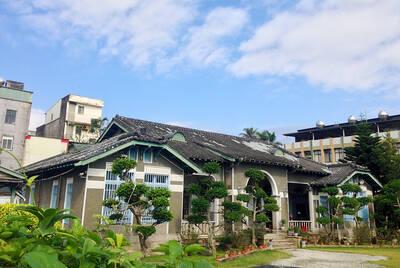As the PC games industry has established itself in Taiwan, both the government and the new generation of firms that have entered this emerging sector are pushing for local development both of software and related hardware components.
One recent development has been breakthroughs in chip design for the Xear 3D Sound Technology (X3DST) released by C-Media Electronics Inc (
"In the past, Taiwan has focused primarily in developing new game software, but in the area of hardware components -- primarily graphics and sound -- it has had to rely on imports whose price has remained high.
"At the same time, Taiwan was doing much of the OEM for these foreign products, and with good results, so that a solid foundation for self-produced cards has been established," said Chang Wen-tsung (張文村), deputy managing director of the Multimedia Technology Lab of the Institute of Information Industry. According to Eric Cheng (鄭期成), president of C-Media, through the use of the Xear technology, C-Media has been able to create a 5.1 channel, 360-degree surround sound effect using a single set of headphones and a set of 3D speakers. Conventionally, this has required six speakers to achieve.
C-Media has now combined forces with Taiwan's biggest online games company Gamania Digital Entertainment (
According to Cheng (
"It will even allow voice alteration, so that men can speak as women and women as men. The voice can be set to match the age, sex and profession of the character portrayed in the online game," Cheng added.
As for the background music to games, this is played in 3D surround sound as if from six speakers, giving it enormous power. "More importantly, said Bryan Yueh (
"In an online game, there are hundreds or even thousands of players in the game. The sound should reflect the different location of players, with voices coming from above or below, from close by or from a distance. This is really quite difficult to achieve. Something like Microsoft's 3D Direct, which is what most chips support, simply is not capable of the three dimensional positioning of sound, re-recreating the noise of an approaching enemy or the swoosh of a weapon as it just misses you, Yueh said.
Yueh emphasized that in future, an increasing number of games will have built-in support for X3DST so that players can have 3D surround sound at the lost possible cost. The technology will be showcased in a new 3D online role-playing game to be released on Sept. 20 at the Tokyo computer show called Noah's Ark.
The feature that X3DST stand out is its attention to details. Stuff like the direction from which a sound comes, the force of the sound, and the different sounds made by the impact of a weapon against wood, metal or flesh. 涗3DST makes use of "sound coding" technology which can record small differences in the nature of a sound, such as the loudness of the sound and the distance from which it comes, said Cheng.
"This allows it to approximate real world sounds much more closely."
Even more importantly from the consumer's point of view is that with X3DST it is not necessary to purchase six sets of speakers to achieve this result. "All you need is two speakers, three if you add a base speaker, and a set of headphones. It is a great saving in cost and in space," Cheng added.

From the last quarter of 2001, research shows that real housing prices nearly tripled (before a 2012 law to enforce housing price registration, researchers tracked a few large real estate firms to estimate housing price behavior). Incomes have not kept pace, though this has not yet led to defaults. Instead, an increasing chunk of household income goes to mortgage payments. This suggests that even if incomes grow, the mortgage squeeze will still make voters feel like their paychecks won’t stretch to cover expenses. The housing price rises in the last two decades are now driving higher rents. The rental market

July 21 to July 27 If the “Taiwan Independence Association” (TIA) incident had happened four years earlier, it probably wouldn’t have caused much of an uproar. But the arrest of four young suspected independence activists in the early hours of May 9, 1991, sparked outrage, with many denouncing it as a return to the White Terror — a time when anyone could be detained for suspected seditious activity. Not only had martial law been lifted in 1987, just days earlier on May 1, the government had abolished the Temporary Provisions Effective During the Period of National Mobilization for Suppression of the Communist

When life gives you trees, make paper. That was one of the first thoughts to cross my mind as I explored what’s now called Chung Hsing Cultural and Creative Park (中興文化創意園區, CHCCP) in Yilan County’s Wujie Township (五結). Northeast Taiwan boasts an abundance of forest resources. Yilan County is home to both Taipingshan National Forest Recreation Area (太平山國家森林遊樂區) — by far the largest reserve of its kind in the country — and Makauy Ecological Park (馬告生態園區, see “Towering trees and a tranquil lake” in the May 13, 2022 edition of this newspaper). So it was inevitable that industrial-scale paper making would

Hualien lawmaker Fu Kun-chi (傅?萁) is the prime target of the recall campaigns. They want to bring him and everything he represents crashing down. This is an existential test for Fu and a critical symbolic test for the campaigners. It is also a crucial test for both the Chinese Nationalist Party (KMT) and a personal one for party Chairman Eric Chu (朱立倫). Why is Fu such a lightning rod? LOCAL LORD At the dawn of the 2020s, Fu, running as an independent candidate, beat incumbent Democratic Progressive Party (DPP) lawmaker Hsiao Bi-khim (蕭美琴) and a KMT candidate to return to the legislature representing